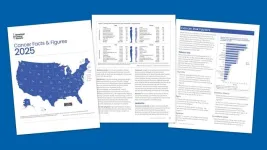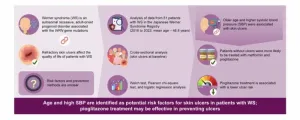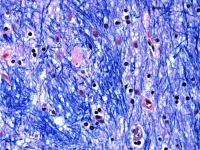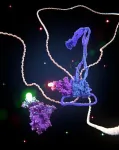(Press-News.org) Siblings share a unique bond built from shared memories, family rituals and the occasional argument. But ask almost anyone with a brother or sister and you’ll likely find a longstanding debate: who’s the favorite? New research from BYU sheds some light on that playful rivalry, revealing how parents might subtly show favoritism based on birth order, personality and gender.
The study, conducted by BYU School of Family Life professor Alex Jensen, found that younger siblings generally receive more favorable treatment from parents. Meanwhile, older siblings are often granted more autonomy, and parents are less controlling towards them as they grow up.
“It is helpful to take the findings from this study and be aware of the patterns that could be happening in your family,” Jensen said. “When parents are aware, they can make small adjustments that benefit everyone.”
The study discovered parents tend to favor daughters slightly more than sons, although only parents tend to recognize the bias — children did not.
Personality also plays a big role. Children who are agreeable and responsible, regardless of birth order or gender, generally receive more favorable treatment as well.
“Most parents probably connect more easily with one child over another, whether that be due to personality, birth order, gender or other things like shared interests,” Jensen said. “Watch for those patterns within yourself. Pay attention to how your children react to things that could be perceived as favoritism.”
Jensen says it’s important to understand that these dynamics aren’t only about sibling rivalry — they’re about well-being. His other research shows that children who feel less favored by their parents are more likely to experience poor mental health and to engage in problematic behavior at home or school.
“Keep an eye out for things that seem unfair. Your children will let you know if they think something is unfair. Pay attention to them when they make that known,” Jensen said. “Either they are missing perspective and understanding, or you need to make some changes in your parenting. Make sure you are open to the latter.”
To conduct the study, Jensen and his colleagues examined data from more than 19,000 individuals, drawing from a wide range of published and unpublished sources. The research provides a broad view of how parental preferences manifest and how they can influence children throughout their lives.
“Sometimes parents get so concerned about treating their kids the same that they may overlook individual needs,” Jensen noted. “We’re not suggesting parents feel guilty; instead, parents can look at this research and use it as encouragement to look at places where they can improve, without going to extremes.”
Jensen says he’s hopeful that the study sheds light on family dynamics that are often felt but rarely discussed. Favoritism, whether intentional or unintentional, can shape sibling relationships and individual well-being. By recognizing these patterns, parents can foster stronger family bonds in meaningful ways
“The simple answers are perhaps the best. Be patient with yourself and with your children,” Jensen said. “Spend time together. Do things together that you like to do. Do things together that your children like to do. Work together, serve others together, worship together. Relationships take time and time together doing a variety of things will have many positive benefits.”
END
Do parents really have a favorite child? Here’s what new research says
Parents tend to favor younger siblings, daughters, and the more agreeable—often without realizing it
2025-01-16
ELSE PRESS RELEASES FROM THIS DATE:
Mussel bed surveyed before World War II still thriving
2025-01-16
A mussel bed along Northern California’s Dillon Beach is as healthy and biodiverse as it was about 80 years ago, when two young students surveyed it shortly before Pearl Harbor was attacked and one was sent to fight in World War II.
Their unpublished, typewritten manuscript sat in the UC Davis Bodega Marine Laboratory’s library for years until UC Davis scientists found it and decided to resurvey the exact same mussel bed with the old paper’s meticulous photos and maps directing their way.
The new findings, published in the journal Scientific Reports, document ...
ACS Annual Report: Cancer mortality continues to drop despite rising incidence in women; rates of new diagnoses under 65 higher in women than men
2025-01-16
ATLANTA, January 16, 2025 — The American Cancer Society (ACS) today released Cancer Statistics, 2025, the organization’s annual report on cancer facts and trends. The new findings show the cancer mortality rate declined by 34% from 1991 to 2022 in the United States, averting approximately 4.5 million deaths. However, this steady progress is jeopardized by increasing incidence for many cancer types, especially among women and younger adults, shifting the burden of disease. For example, incidence rates in women 50-64 years of age have surpassed those in ...
Fewer skin ulcers in Werner syndrome patients treated with pioglitazone
2025-01-16
“[…] the results of this study indicate that pioglitazone might be useful in treating refractory skin ulcers, a typical condition that reduces the quality of life of patients with WS.”
BUFFALO, NY- January 16, 2025 – A new research paper was published in Aging (listed by MEDLINE/PubMed as “Aging (Albany NY)” and “Aging-US” by Web of Science) Volume 16, Issue 22 on December 2, 2024, entitled “Less frequent skin ulcers among patients with Werner syndrome treated with pioglitazone: findings from the Japanese Werner Syndrome Registry.”
Scientists ...
Study finds surprising way that genetic mutation causes Huntington’s disease, transforming understanding of the disorder
2025-01-16
Scientists at the Broad Institute of MIT and Harvard, Harvard Medical School, and McLean Hospital have discovered a surprising mechanism by which the inherited genetic mutation known to cause Huntington’s disease leads to the death of brain cells. The findings change the understanding of the fatal neurodegenerative disorder and suggest potential ways to delay or even prevent it.
For 30 years, researchers have known that Huntington’s is caused by an inherited mutation in the Huntingtin (HTT) gene, but they didn’t ...
DNA motors found to switch gears
2025-01-16
Scientists from Delft, Vienna, and Lausanne discovered that the protein machines that shape our DNA can switch direction. Until now, researchers believed that these so-called SMC motors that make loops into DNA could move in one direction only. The discovery, which is published in Cell, is key to understanding how these motors shape our genome and regulate our genes.
Connecting DNA
“Sometimes, a cell needs to be quick in changing which genes should be expressed and which ones should be turned off, for example in response to food, alcohol or heat. To turn genes off and on, cells use Structural Maintenance ...
Human ancestor thrived longer in harsher conditions than previous estimates
2025-01-16
An early human ancestor of our species successfully navigated harsher and more arid terrains for longer in Eastern Africa than previously thought, according to a new study published in Nature Communications Earth & Environment.
Homo erectus, the first of our relatives to have human-like proportions and the first known early human to migrate out of Africa, was the focus of the new study led by the international research team.
The researchers analysed evidence from Engaji Nanyori in Tanzania’s Oldupai Gorge, revealing Homo erectus thrived ...
Evolution: Early humans adapted to extreme desert conditions over one million years ago
2025-01-16
Homo erectus was able to adapt to and survive in desert-like environments at least 1.2 million years ago, according to a paper published in Communications Earth & Environment. The findings suggest that behavioural adaptations included returning repeatedly over thousands of years to specific rivers and ponds for fresh water, and the development of specialised tools. The authors propose that this capability to adapt may have led to the expansion of H. erectus’ geographic range.
There has been significant debate over ...
Race and ethnicity and diffusion of telemedicine in Medicaid for schizophrenia care after onset of the COVID-19 pandemic
2025-01-16
About The Study: In this cohort study of Medicaid beneficiaries with schizophrenia, telemental health care diffused rapidly after the onset of the COVID-19 pandemic, particularly in state-operated agencies. Together, agency-level and beneficiary-level race and ethnicity findings suggest within-agency racial and ethnic differences in diffusion of telemental health care. States should monitor the diffusion of innovations across vulnerable populations.
Corresponding Author: To contact the corresponding author, Sharon-Lise Normand, PhD, email sharon@hcp.med.harvard.edu.
Embed this link to provide your readers free access to the full-text article This ...
Changes in support for advance provision and over-the-counter access to medication abortion
2025-01-16
About The Study: In this serial cross-sectional analysis of people ages 15 to 49 before Dobbs and 1 year after Dobbs, findings suggested that national support for expanded access to medication abortion has grown. Alternative models of care, such as advance provision and over-the-counter, have the potential to offer a promising approach to abortion care, particularly for people living in abortion-restricted states.
Corresponding Author: To contact the corresponding author, M. Antonia Biggs, PhD, email antonia.biggs@ucsf.edu.
To access the embargoed study: Visit ...
Protein level predicts immunotherapy response in bowel cancer
2025-01-16
Francis Crick Institute press release
Under strict embargo: 16:00hrs GMT Thursday 16 January 2025
Peer reviewed
Observational study
People and cells
Protein level predicts immunotherapy response in bowel cancer
Researchers at the Francis Crick Institute and Barts Cancer Institute, Queen Mary University of London, have shown that the amount of a protein called CD74 can indicate which people with bowel cancer may respond best to immunotherapy.
If integrated into the clinic, testing for this protein could potentially allow hundreds of previously ineligible patients to benefit ...
LAST 30 PRESS RELEASES:
Brainwaves of mothers and children synchronize when playing together – even in an acquired language
A holiday to better recovery
Cal Poly’s fifth Climate Solutions Now conference to take place Feb. 23-27
Mask-wearing during COVID-19 linked to reduced air pollution–triggered heart attack risk in Japan
Achieving cross-coupling reactions of fatty amide reduction radicals via iridium-photorelay catalysis and other strategies
Shorter may be sweeter: Study finds 15-second health ads can curb junk food cravings
Family relationships identified in Stone Age graves on Gotland
Effectiveness of exercise to ease osteoarthritis symptoms likely minimal and transient
Cost of copper must rise double to meet basic copper needs
A gel for wounds that won’t heal
Iron, carbon, and the art of toxic cleanup
Organic soil amendments work together to help sandy soils hold water longer, study finds
Hidden carbon in mangrove soils may play a larger role in climate regulation than previously thought
Weight-loss wonder pills prompt scrutiny of key ingredient
Nonprofit leader Diane Dodge to receive 2026 Penn Nursing Renfield Foundation Award for Global Women’s Health
Maternal smoking during pregnancy may be linked to higher blood pressure in children, NIH study finds
New Lund model aims to shorten the path to life-saving cell and gene therapies
Researchers create ultra-stretchable, liquid-repellent materials via laser ablation
Combining AI with OCT shows potential for detecting lipid-rich plaques in coronary arteries
SeaCast revolutionizes Mediterranean Sea forecasting with AI-powered speed and accuracy
JMIR Publications’ JMIR Bioinformatics and Biotechnology invites submissions on Bridging Data, AI, and Innovation to Transform Health
Honey bees navigate more precisely than previously thought
Air pollution may directly contribute to Alzheimer’s disease
Study finds early imaging after pediatric UTIs may do more harm than good
UC San Diego Health joins national research for maternal-fetal care
New biomarker predicts chemotherapy response in triple-negative breast cancer
Treatment algorithms featured in Brain Trauma Foundation’s update of guidelines for care of patients with penetrating traumatic brain injury
Over 40% of musicians experience tinnitus; hearing loss and hyperacusis also significantly elevated
Artificial intelligence predicts colorectal cancer risk in ulcerative colitis patients
Mayo Clinic installs first magnetic nanoparticle hyperthermia system for cancer research in the US
[Press-News.org] Do parents really have a favorite child? Here’s what new research saysParents tend to favor younger siblings, daughters, and the more agreeable—often without realizing it






